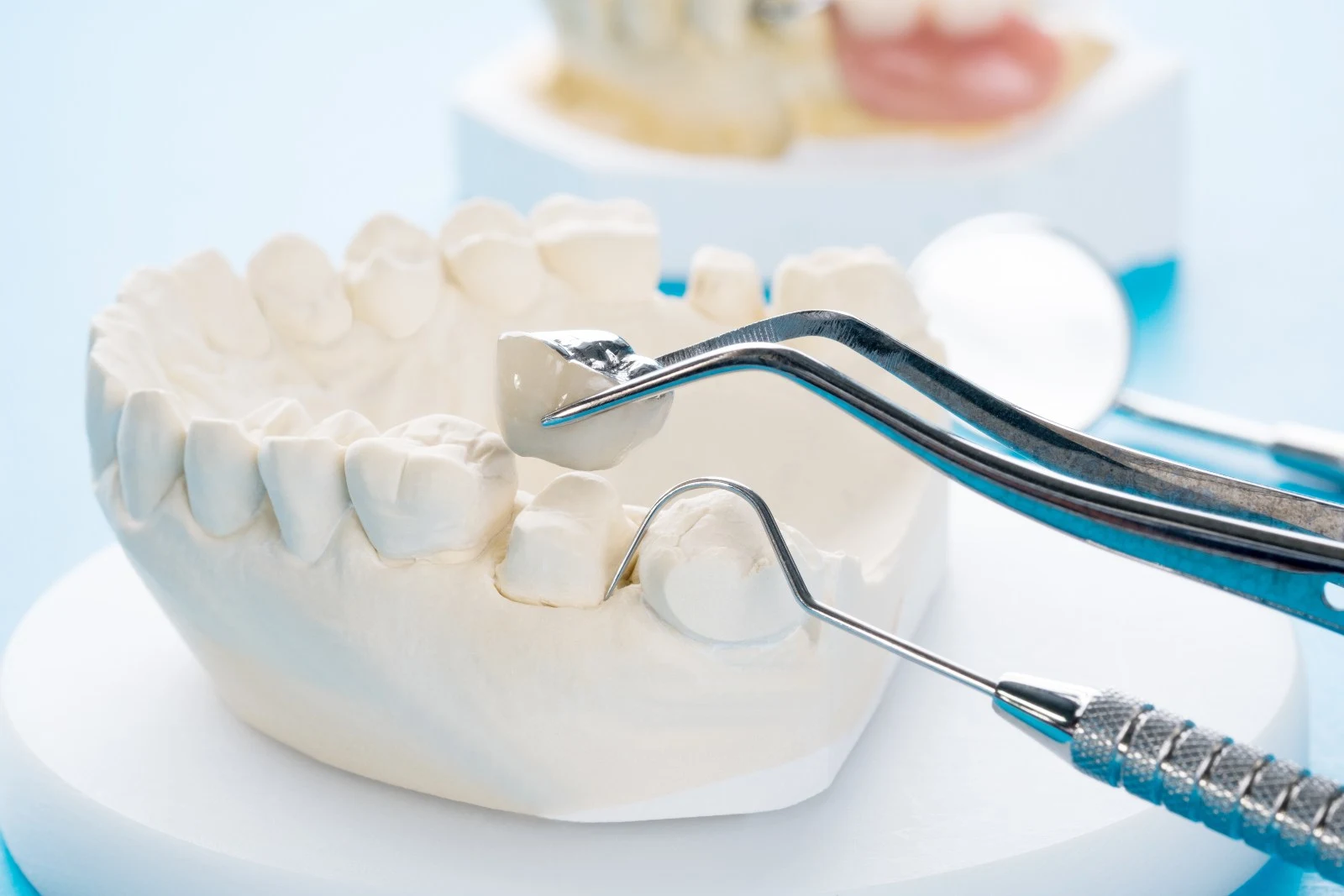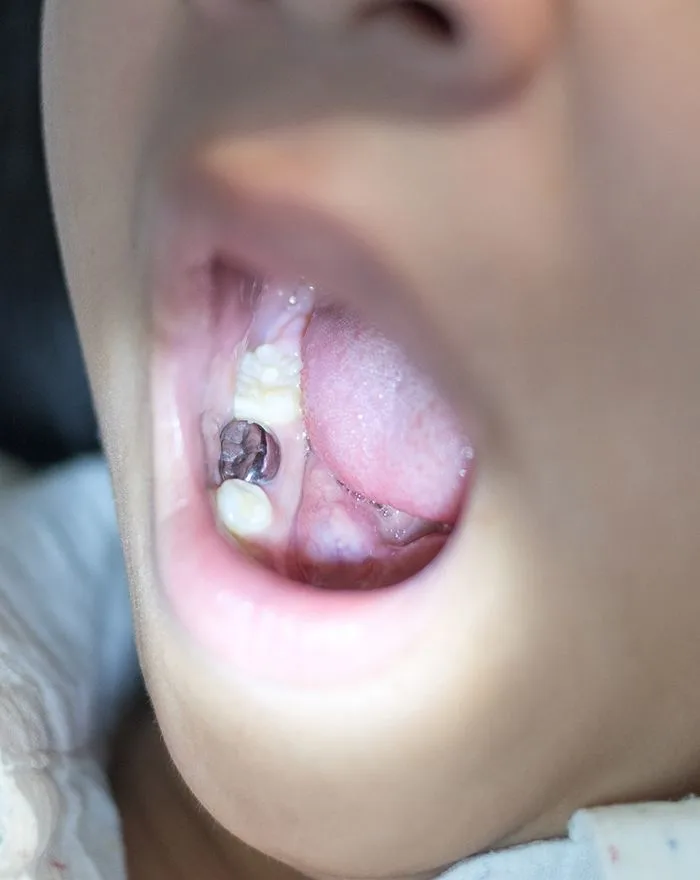
Pediatric Dental Crowns In Rock Hill, SC
No parent wants their kid to deal with toothaches or damaged teeth. Pediatric dental crowns are specifically made for tiny teeth to restore those that have been too damaged by decay or injury to be repaired with a simple filling. Keep your child’s smile healthy as they grow and develop.
Why should my child get a pediatric dental crown?
Dental crowns are the best way to repair your child’s cracked, broken, decayed, or infected tooth. During the crown process, your pediatric dentist will remove all the decayed and damaged material. Then, they’ll fit your child for a strong, durable, and long-lasting crown that will cover your child’s tooth and protect it. With a crown, you can prevent further damage, relieve discomfort, and get peace of mind. You’ll know that your child’s tooth will stay healthy for years to come. The best thing about a crown is once the baby tooth is ready to naturally come out, the crown comes off right with it!
.webp)
The Benefits of Pediatric Dental Crowns
One-and-Done Protection for Baby Teeth
Stainless steel crowns (SSCs) are the gold standard for protecting damaged baby teeth. While they may not be the cheapest option up front, they often save families money in the long run. That's because SSCs are incredibly durable, do not fall out or get recurrent decay, you won't have to worry about that tooth again. No replacements, no repeat visits-just strong, reliable protection until the tooth naturally falls out.
Prevent Complications
If your pediatric dentist recommends a crown for your child and they don’t get treatment, they could be at risk of further problems like tooth infections. These complications could cause pain and discomfort, worsen their oral health, and lead to additional costly treatments like root canal therapy. With a crown, you can protect their tooth and avoid these complications entirely.
Minimally-Invasive
Dental crowns only involve removing material from the outside of the tooth, so they're minimally-invasive. Your pediatric dentist will numb your child’s mouth and can also explore sedation options if necessary to keep them comfortable during treatment. You can trust us to deliver the expert, child-friendly care your little one needs.
Our Difference
The Pediatric Dental Crown Treatment Process
Tooth Numbing & Preparation
To begin the process, your child’s dentist will numb their mouth. Then, they will use a drill to remove all of the damaged or decayed enamel from their tooth. They will shape the tooth into a strong, stable platform. This ensures the dental crown can attach tightly to the remaining tooth.
Dental Crown Fitting
After your child's tooth has been prepared, their dentist will try on different pre-fitted stainless steel crown sizes- we compare this to be like trying on different size hats for each tooth with our little patients. Once we find the perfect size, we are ready for the final step.
Cementing the Crown
The dentist will take the perfect-sized crown for the tooth and place bonding cement in it. The crown is then cemented onto the tooth, and the area is thoroughly cleaned so no excess cement remains. Your child will leave with a fully-functioning, restored-to-health tooth.
FAQs
Frequently Asked Questions
Check out these frequently asked questions, or call us to speak with our team.
Pediatric dental crowns are often used when a cavity is too large for a filling or after a baby root canal (pulpotomy). Because the crown covers the entire tooth, it keeps it strong and helps prevent any more issues down the road.
Crowns can also come in handy if your child chips or cracks a tooth during a fall, sports, or just rough play. They restore the tooth’s shape and strength so your child can bite, chew, and smile like normal.
One of the biggest perks of a stainless steel crown? Once it’s on, that tooth is fully protected from future cavities. You don’t have to worry about more fillings or decay—it’s sealed and safe until the tooth naturally falls out.
Your child’s dentist will be the best judge of whether or not they need a dental crown. In some cases, an alternative treatment like dental bonding or a dental filling may be a good option. However, if you think that your child has a deep cavity or an infected tooth, it’s likely that a crown is the best way to restore their smile.
Additionally, if your child suffers from an oral injury and you see that one of their teeth is visibly damaged, they may need a dental crown. In both cases, you should contact your child’s dentist right away to get an emergency consultation and ensure they get the treatment they need.
Yes. Pediatric dental crowns are very durable, and almost always last the lifespan of the baby tooth. They are intended to cover up and protect your child’s tooth until it falls out naturally, and is replaced by an adult tooth.
No. There is no lengthy recovery process after your child gets a crown. They can resume their day-to-day activities immediately after their appointment and maintain a normal diet. Your child’s tooth may feel a bit sore or tender for a week or two after it’s been placed, but this is normal. Some minor sensitivity is nothing to worry about, as this issue will go away on its own.
To care for your child’s dental crown, all you need to do is treat it like a natural tooth. You will need to brush their teeth at least twice per day for two minutes, and floss their teeth once per day. Depending on their age, they may be able to do this themselves.
Beyond proper oral hygiene, you should make sure your child eats a tooth-friendly, healthy diet low in sugary foods and drinks. You should also set appointments for your child to see their pediatric dentist every six months for a check-up and a teeth cleaning. If you follow these simple steps, your child’s crown will last for years.
Restorative dental care for children is almost always covered by dental insurance, so you can expect your insurance company to cover the cost of one or more pediatric dental crowns. However, the coverage limits, deductibles, and specifics of each insurance policy differ.
For that reason, we highly recommend consulting with your insurer directly to learn more about your coverage before you schedule your child’s appointment with their dentist. This will ensure that you avoid any unexpected bills, and that your child’s treatment is completely covered.



